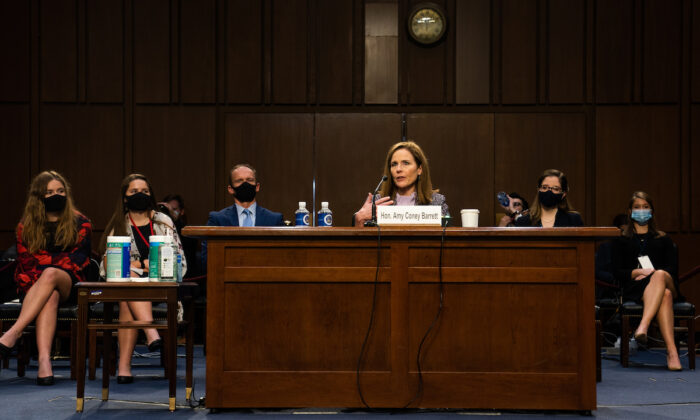Australian Universities Protest New Foreign Interference Law
Senate Judiciary Committee Ranking Member Dianne Feinstein (D-Calif.) said on Wednesday that she was “really impressed” by Judge Amy Coney Barrett’s explanation of a legal doctrine that is central in a pending Supreme Court case challenging the Affordable Care Act (ACA), also known as Obamacare.
Barrett, who is nominated to the Supreme Court, continued fielding questions from senators as the marathon hearing entered its third day. She was again asked questions related to the upcoming Supreme Court case, California v. Texas, that challenges former President Barrack Obama’s signature health care law, and the issue of severability, which is one of the main questions in that case.
Barrett continued to invoke the standard that judges should not offer their opinion or views on pending cases or “grade” precedents, but afforded the senators a detailed explanation on the doctrine of severability.
 Supreme Court nominee Judge Amy Coney Barrett testifies on the third day of her confirmation hearing before the Senate Judiciary Committee on Capitol Hill on October 14, 2020 in Washington, DC.
Supreme Court nominee Judge Amy Coney Barrett testifies on the third day of her confirmation hearing before the Senate Judiciary Committee on Capitol Hill on October 14, 2020 in Washington, DC.“I think the doctrine of severability, as it’s been described by the court, you know, serves a valuable function of trying not to undo your work when you wouldn’t want a court to undo your work,” Barrett told Feinstein when the California senator asked her what she thought of severability in the context of the ACA.
“Severability strives to look at a statute as a whole and say: Would Congress have considered this provision so vital that kind of in the Jenga game pulling it out Congress wouldn’t want the statute anymore? So it’s designed to effectuate your intent.
“But you know, severability is designed to say well, would Congress still want the statute to stand even with this provision gone? Would Congress still pass the same statute without it? So I think insofar as it tries to effectuate what Congress would have wanted, it’s the court and Congress working hand in hand,” she added.
Following Barrett’s response, Feinstein told the judge: “Thank you. That’s quite a definition. I’m really impressed.”
The judge also answered a question about severability from committee chairman Sen. Lindsey Graham (R-S.C.) in which she told him that “the presumption is always in favor of severability.”
 Ranking member Sen. Dianne Feinstein (D-Calif.) looks on during the third day of Judge Amy Coney Barrett’s Supreme Court confirmation hearing on Capitol Hill on Oct. 14, 2020 in Washington. (Stefani Reynolds-Pool/Getty Images)
Ranking member Sen. Dianne Feinstein (D-Calif.) looks on during the third day of Judge Amy Coney Barrett’s Supreme Court confirmation hearing on Capitol Hill on Oct. 14, 2020 in Washington. (Stefani Reynolds-Pool/Getty Images)Democrats have expressed concern that the Supreme Court could strike down the health care law in the pending case, which is scheduled for oral arguments on Nov. 10. Senate Democrats have been trying to tie Barrett to Obamacare as she could be confirmed in time to join the Supreme Court to hear the case. They have been making the case that the judge, who is appointed by President Donald Trump, would not hesitate to overturn the law, however, Barrett has repeatedly expressed in the hearing that she has no animus or hostility toward the ACA.
“I’m not here on a mission to destroy the Affordable Care Act. I’m just here to apply the law and adhere to the rule of law,” Barrett said during day two of the confirmation hearings.
The case in question deals with whether a provision in the law, referred to as the “individual mandate,” which required people to obtain health insurance or pay a tax penalty, is unconstitutional after Congress removed the tax penalty in 2017, rendering the law unenforceable.
If the top court finds that the law is unconstitutional, the justices would have to weigh whether the provision is so vital that removing it would collapse the entire ACA.
A group of Republican-led states and two individuals, who filed the lawsuit, are arguing that the provision is unconstitutional and the entire ACA needed to be invalidated because the provision was inseverable from the rest of the law.
A district court judge in Texas found in favor of the plaintiffs and an appeals court upheld the plaintiffs’ constitutional claims and sent the case back to the district court for a more detailed review of the question of severability.
The U.S. House of Representatives and a group of Democrat-led states then escalated the case to the Supreme Court, requesting their intervention. The top court agreed to take on the case in March.
The Trump administration and Republicans have taken steps to weaken the ACA in an effort to ultimately repeal and replace the Obama-era law with more lower-cost options. They say the ACA represented government overreach and increased the cost of health care. Meanwhile, Democrats have vowed to strengthen the law following the Republicans’ efforts to invalidate the law through this case.
Focus News: Feinstein Says She Is ‘Really Impressed’ by Barrett’s Definition of ‘Severability’ in Relation to Obamacare
Twitter to Pay Fine of $100,000 for Campaign Finance Violations
